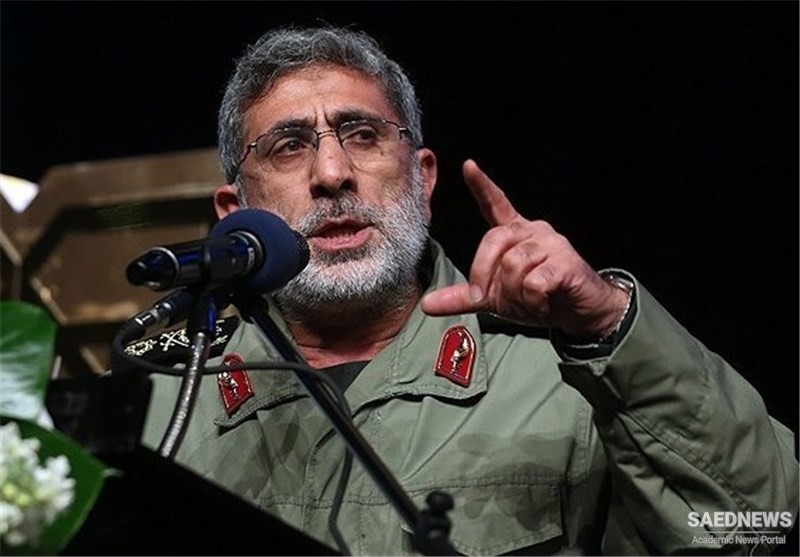Tehran, SAEDNEWS, Nov. 22: “All wise people working for the enemies have understood and some of them say, although some do not, that the time for showing the same behavior they had with the Islamic Republic on the first days of the Revolution has ended. Today all hues and cries of enemies are aimed at preventing (controlling) our speed (of progress),” General Qa’ani said.
He added that all enemies’ hostilities and deployment of forces in the region are aimed at preventing Iran’s development of its missile and regional power, and stressed, “The time when they attacked us and we defended has ended.”
General Qa’ani warned of enemies’ various plots against Iran and their disloyalty to the deals and treaties that they have endorsed (alluding to Trump’s unilateral withdrawal from the nuclear deal), and said, “You witness everyday that all leaders sit to the table and sign a paper and then they violate their signature before the eyes of the world people with full rudeness and shamelessness. They are not qualified for negotiations.”
His comments came after US media reports claimed that Iranian Deputy Foreign Minister Seyed Abbas Araqchi has tried to contact President-elect Joe Biden’s advisers.
Iranian Foreign Ministry Spokesman Saeed Khatibzadeh rejected the report as fake and a good example of yellow journalism.
"The report that was released few days ago is completely fake," he said on Friday.
Iran has repeatedly reiterated that the election of Trump's Democratic rival Joe Biden as the US President is not very important to Iran.
US President-elect Joe Biden has recently said in a CNN article that he wants a renegotiation of the contents of the deal before he agrees to rejoin the agreement.
“I will offer Tehran a credible path back to diplomacy. If Iran returns to strict compliance with the nuclear deal, the United States would rejoin the agreement as a starting point for follow-on negotiations. With our allies, we will work to strengthen and extend the nuclear deal's provisions, while also addressing other issues of concern,” he wrote, mentioning that he wants changes to the contents of the nuclear deal and guarantees from Tehran that it would be open for compromise to strike multiple deals over its missile and regional powers as well as a number of other issues that have been the bones of contention between the two sides in the last four decades.
In response, Iran's Foreign Minister Mohammad Javad Zarif had stressed that the US has violated the nuclear deal and is in no position to ask for any conditions for its return to the JCPOA, adding that it's Tehran that has its own terms to allow the US back into the internationally endorsed agreement.
The foreign minister has reiterated time and again that Tehran would not change even a single word of the agreement, and cautioned the US that it needs to pay reparations for the damage it has inflicted on Iran through its retreat from the nuclear agreement and give enough ensurances that it would not go for initiating the trigger mechanism again before it could get back to the deal.
US President Donald Trump, a stern critic of the historic deal, unilaterally pulled Washington out of the JCPOA in May 2018, and unleashed the “toughest ever” sanctions against the Islamic Republic in defiance of global criticism in an attempt to strangle the Iranian oil trade, but to no avail since its "so-called maximum pressure policy" has failed to push Tehran to the negotiating table.
In response to the US’ unilateral move, Tehran has so far rowed back on its nuclear commitments four times in compliance with Articles 26 and 36 of the JCPOA, but stressed that its retaliatory measures will be reversible as soon as Europe finds practical ways to shield the mutual trade from the US sanctions.
Tehran has particularly been disappointed with failure of the three European signatories to the JCPOA -- Britain, France and Germany -- to protect its business interests under the deal after the United States' withdrawal.
On January 5, Iran took a final step in reducing its commitments, and said it would no longer observe any operational limitations on its nuclear industry, whether concerning the capacity and level of uranium enrichment, the volume of stockpiled uranium or research and development.
In relevant remarks earlier this month, Araqchi said that the US should lift all sanctions imposed against his country in the past 3 years before returning to the nuclear deal.
“If the US wants to return, all sanctions which have been imposed in this period of time (past 3 years) should be removed. This is not a precondition for returning to the nuclear deal but it is the nuclear deal itself,” Araqchi said.
He added that of course there are other challenges that Iran and the US should talk about (within the framework of the nuclear deal) and the ground should be paved for the US return to the nuclear deal in a way that will meet the Iranian people’s interests.
“The world is now speaking about one point and the entire world has accepted that the (US) policy of maximum pressure has failed and did not attain any of its goals,” Araqchi said (Source: Fars News).
 Commander in Chief of IRI Army: Iran Is to Deploy Modern Air Defense Systems in Northwestern Borders
Commander in Chief of IRI Army: Iran Is to Deploy Modern Air Defense Systems in Northwestern Borders
















































